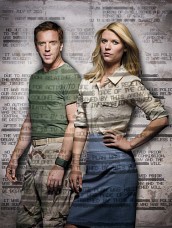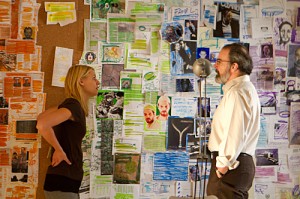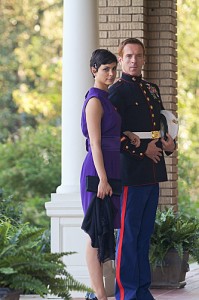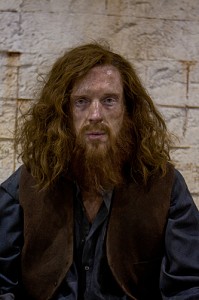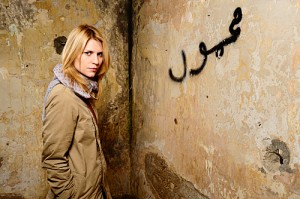Showtime’s HOMELAND has just been nominated for a batch of Golden Globe Awards, including Drama Series, leading actress Claire Danes and leading actor Damian Lewis. Small wonder – the series, based on an Israeli drama called HATUFIM, has kept audiences riveted as Danes’ dedicated but unstable CIA agent Carrie Mathison tries to prove that Lewis’ former POW war hero Nicholas Brody has been turned by his captors and is planning a terrorist act on U.S. soil.
HOMELAND executive producers Howard Gordon and Alex Gansa, who adapted the material for American television, aren’t exactly novices when it comes to making shows about counter-terrorism – they spent years working on the adventures of Jack Bauer on Fox’s hit 24. With a second season of HOMELAND already guaranteed, they have every reason to sound happy as they talk about the first season of their hit, which has its ninety-minute first-season finale tonight at 10 PM.
ASSIGNMENT X: When 24 concluded, were you guys feeling, “We’d like to do something else in this vein” or did you feel, “Dear God, get us out of the espionage business” and a hand reached up from the grave and dragged you back in?
HOWARD GORDON: A little bit. This is the stuff honestly that I’m most interested in. I’m just fascinated, and Alex and I probably spend most of our time talking about what’s happening in the world. So this stuff [is interesting] – the enemies from within, meaning Americans themselves. What does it mean to be an American? How do we [Americans] exercise our power in the world? And what do we need to be afraid of and what’s the nature of fear and celebrity and all those things? Those are questions that are just interesting, and I think Alex and I took these interests, that are perpetual and alive and very much in the news, and found characters to ask them and to mess around in that playground. That’s my metaphor.
ALEX GANSA: I will say that the experience of working on 24 was one of the most unbelievable professional experiences of my life. The group of writers who were in that room every day made it so amazing. Everybody was so smart, and the plotting of that show was so intricate and so difficult, but so rewarding that we were clearly ready to segue into another show about Homeland Security.
AX: What were you happiest with about 24?
GANSA: Oh, I think what I was happiest about with 24 was the intensity that we brought to each episode. That was what was most rewarding about doing that show. And being able to do things like land planes on the freeway. I mean, the production was so astonishing. It was one of those shows where everybody bettered the ball. The scripts, the production bettered it, actors bettered it, editorial bettered it, and it became just a phenomenon. It was fantastic.
AX: Do you have any of your cast, staff or crew from 24 on HOMELAND?
GANSA: We do have a few crew people and a key writer from 24 – our line producer is from 24. Chip Johannesson, who’s one of our writers, is from 24. We have a few actors, but not a lot, a few guest stars from our 24 days.
AX: You two, Gordon and Gansa, had worked together back in your early days on shows including BEAUTY AND THE BEAST, then went your separate ways for awhile, and reunited on 24?
GANSA: Yeah. Howard and I met in college. And we decided to come to Hollywood. And we worked together for seven years, we were [professionally] married for seven years, we got divorced, and now we have a little bit of a reunion here, but it’s so great.
AX: How did you wind up doing HOMELAND?
GANSA: Rick Rosen, our mutual agent, found the show. It was originally an Israeli show called HATUFIM, which is Hebrew for “prisoner of war.” It’s a very different show in Israel than it is here. The Israeli series is exclusively about the personal lives of the prisoners of war who are returned to Israel. The American series has a P.O.W. returning, but it is determined that he may have been turned in captivity. So we added a thriller element to what is a family drama in the Israeli series.
AX: Do you feel there are echoes of 24 in HOMELAND at all?
GANSA: I’ll say two things about that. One is, 24 was a show that existed very much in a post-9/11 environment. Ultimately, at its core, it was an action thriller. This exists ten years later, when things are much more complicated and gray in the world. We are a psychological thriller at our core. And there’s a big difference in the way that this show plays out. 24 was all about adrenaline and testosterone, and this is all about cerebral chess moves. [Also], People actually bathe and urinate in this show.
AX: Did Showtime already have HATUFIM?
GANSA: No, they did not. Howard and I took them HATUFIM and we wrote it on spec and we shopped it around. Howard and [current Showtime executive/former Fox executive] David Nevins have a long relationship based on 24, so David was very interested in something in this genre.
AX: At what point did you decide that HOMELAND’s CIA agent lead should be a woman?
GANSA: Honestly, the first day that Howard and I talked about this show, and how we wanted to do it, we talked about a female CIA agent who was bipolar and whose credibility could come into question. And Claire Danes was our very, very first choice. We heard she was on the cusp of thinking about maybe getting back into television and we thought we would take a run at her.
GORDON: I think we created a character in our minds – we said, “This should be a woman,” and TEMPLE GRANDIN [starring Danes in an award-winning performance] had just come on. Alex and I had called the character “Claire” in our first iteration of the story, just because that’s who we had in our minds. We thought Claire would be perfect, and we called our agents and said, “Is this even a possibility?” And they said, “Write the script and we’ll see.”
AX: Does having a woman lead also help you get further away from a 24 comparison?
GORDON: Yeah, I think that that probably was an unconscious motivator, but in a way, I think the gender issue is not insignificant to it. I think we were trying to find as interesting and unlikely a hero in this métier as possible, and it felt like she should be a woman.
AX: How do you feel Carrie came to become the person we see in the show, including her bipolar disorder?
GORDON: To whatever extent that it’s genetic, she has a father who suffers from the same pathology.
GANSA: Yeah. I never thought there was an event that triggered it, but there are events that exacerbate it. I think that Carrie, growing up, in her formative time as a child, as an adolescent, was just bombarded with all these issues, with Al-Queda coming to the fore and with somebody who was sensitive to that kind of environment – super-sensitive, hyper-sensitive – it completely influenced her life, so that’s one idea.
GORDON: Her age was something Alex and I talked about from the very beginning. On one level, emotionally, she’s somebody who had to have this opportunity to have those things that a woman of her age might aspire to, like a family, like a love interest, but she’s sacrificed everything, so her age is very crucial, because on one hand, she’s still dynamic and still has her future ahead of her, but it’s very much in play here. So is her mental health and so are the things she aspires to. But she’s also someone who came of age at this very, very [volatile] time and has taken up the mantle, whatever it means to be a hero, and has become that hero, but at tremendous cost to herself.
AX: Did the death of Osama Bin Laden do anything to HOMELAND, one way or the other?
GANSA: It’s very indicative of our relationship here is that I was, “We’re dead. No one’s going to care any more – we’re dead.” Howard was, “No, no, it’s really good, it could be really good!” [laughs]
GORDON: Yeah, and I think in the end, it puts more of a punctuation on 24, let’s say.
GANSA: That’s exactly what I just said.
GORDON: It’s not a post 9/11 show. It’s a post-Osama Bin Laden show. And the fact that Bin Laden is dead really does bring a lot of things to the fore. Is America’s appetite for projecting its power overseas – is it sated? Are we going to pull back? And is the war on terror over, whatever that means? And are there people out there who don’t believe it’s over? Are there people out there who believe it should be over? That’s the soup that we’re swimming in.
GANSA: Yeah. The show’s really about the blowback of those involvements and of this sort of three-fronted war – the war on terror, the war in Afghanistan and the war in Iraq
GORDON: And I would say a fourth war, too – the people who come back from those engagements and how they deal with assimilating back into the world, into their families.
GANSA: That’s the price of the war in Afghanistan, is the coming home story.
GORDON: I think what’s interesting is that we have this American hero [Brody], a guy who was in [captivity by enemy forces] – it’s not the usual cast of characters. Of course, we have some people from the Middle East leading into the story, but it really is about this character coming home. I think the irony of his potentially having been turned is really what interested us, and Carrie, as this sort of unreliable prosecutor of this guy was an interesting collision; the show really lives in the fault line of those two characters, and ultimately in their coming together, which as Alex said is sort of the axis of the show, how these two people who, thought they’re hunter and hunted, he’s her quarry, there’s also this connection between them.
AX: You did some location filming in Israel. Did the HATUFIM crew help your production out at all while you were there?
GORDON: We couldn’t have done it without them. That’s one of the great benefits, is that it really was a turnkey operation. They scouted, they helped us, we couldn’t have done it on the budget [without them].
GANSA: We used their whole crew. We used their production designer, their d.p., their costume people, the whole nine yards.
AX: How do they feel about the U.S. version of their show?
GORDON: I feel like they have been nothing but complimentary about what Alex and I have done to their show. A lot of people think they’d be precious and say, “You’ve ruined it” or “You’ve changed it.” It really doesn’t resemble its Israeli version, and they have been nothing but complimentary about our interpretation of that idea.
GANSA: Here’s a kind of a cool thing. We borrowed the idea from them, we changed the idea, and then in the second season of the Israeli show, they borrowed from us in how we changed the show for American television. And we’re going to borrow from their Season Two to help us. So it’s like this crazy circular – it’s really very cool.
AX: Wrapping up HOMELAND’s first season, are you ending on a complete cliffhanger, are you wrapping up the main first-season plot plot or are you blowing up the world so there can’t be a second season?
GANSA: We’re not doing the last one, but I’m not telling you what we’re doing [laughs]. You’ll have to watch.
GORDON: We’re very, very excited. It’s been a remarkably blessed project. We’re happy to finally be presenting it.
LET US KNOW WHAT YOU THINK – COMMENT BELOW!
Related: TV Review: HOMELAND – Season 2 – “The Smile” – Season Premiere
Related: Exclusive Interview with AWAKE executive producer Howard Gordon and star Wilmer Valderrama
Related: Exclusive Interview with HOMELAND star Damian Lewis
Related: Exclusive Interview with HOMELAND star Morena Baccarin
Related: Exclusive Interview with HOMELAND star Claire Danes
Related: TV Review: HOMELAND – Season 1 premiere
Follow us on Twitter at ASSIGNMENT X
Fan us on Facebook at ASSIGNMENTX
Article Source: Assignment X
Article: Exclusive Interview with HOMELAND creators Howard Gordon and Alex Gansa
Related Posts:




